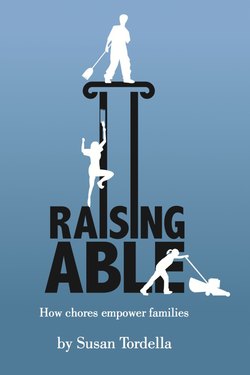Читать книгу Raising Able - Susan Tordella - Страница 12
На сайте Литреса книга снята с продажи.
Highlights of a positive parenting plan
ОглавлениеHere’s an outline of the positive parenting practices in this book so parents can retire as the live-in servants, and counteract entitlement.
•Set a limit, give one kind and firm warning, and then take action. Implement this one practice and it will transform your children’s behavior and family environment.
•Hold family meetings two to four times a month to determine together children's contribution to the household. Children as young as 3 and 4 years old can attend family meetings. Even 2 year olds can take responsibility for small jobs.
•Follow through to make sure children and teens did what they said they going to do, when they said they would. Be diligent if you want results and choose your priorities – not battles unless you want to fight for power.
•Do not pay children for doing chores unless they start paying you for everything you do and provide.
•Pay children a weekly allowance not related to chores. Expect them to budget it to last the week. Model how to manage money and affluenza (a consuming desire for more possessions).
•Prepare and eat a family meal together three or more times a week. Turn off the TV, ban electronics and talk with each other.
•Practice the art of encouragement instead of praise. This is the heart and soul of setting up a positive relationship with your children. Become an encouragement connoisseur.
•Use natural and logical consequences instead of punishment of reward, unless you like power struggles, revenge and resentment.
•Allow yourself the courage to be imperfect and to learn from your mistakes.
•Learn Adler’s theory of why children misbehave and apply it to your tots-to-teens. See Chapter 17, Name it and Tame it.
The goal is to shepherd children through a calm adolescence to finish high school, technical training or college, have the skills and discipline to live independently, hold down a job and form enduring relationships. To reach the goal, allow them to make small decisions during the first decade so they will make good decisions later when you’re not around and they are teenagers, in your car, 60 miles away, going 60 miles an hour. Are they wearing seatbelts? Going the speed limit? Where they said they’d be?
The practices are simple and the household jobs are easy to incorporate. Start with small steps and think big. Have faith even when your children push back and protest saying, “I am not your servant!” Nor are you theirs.
